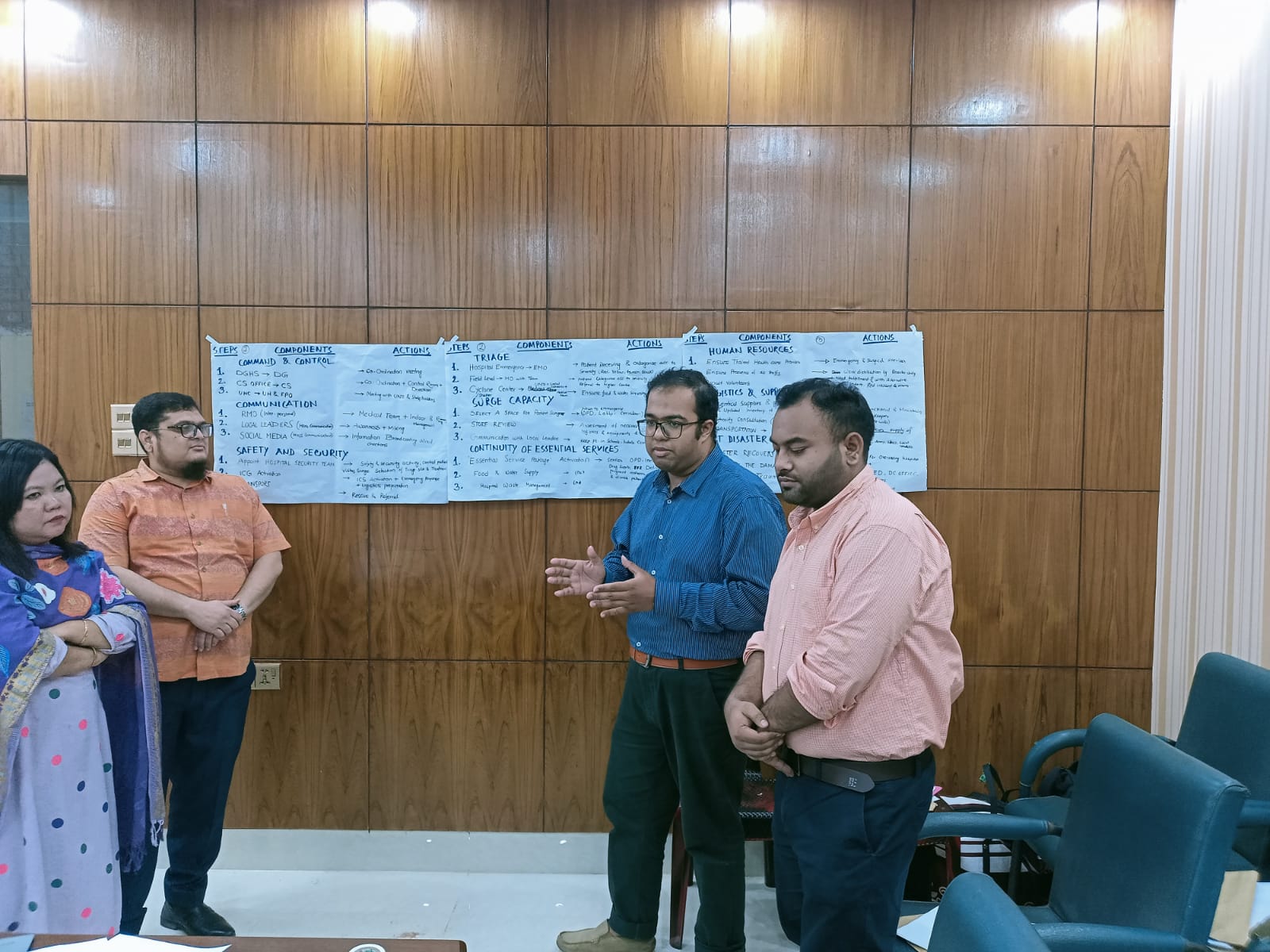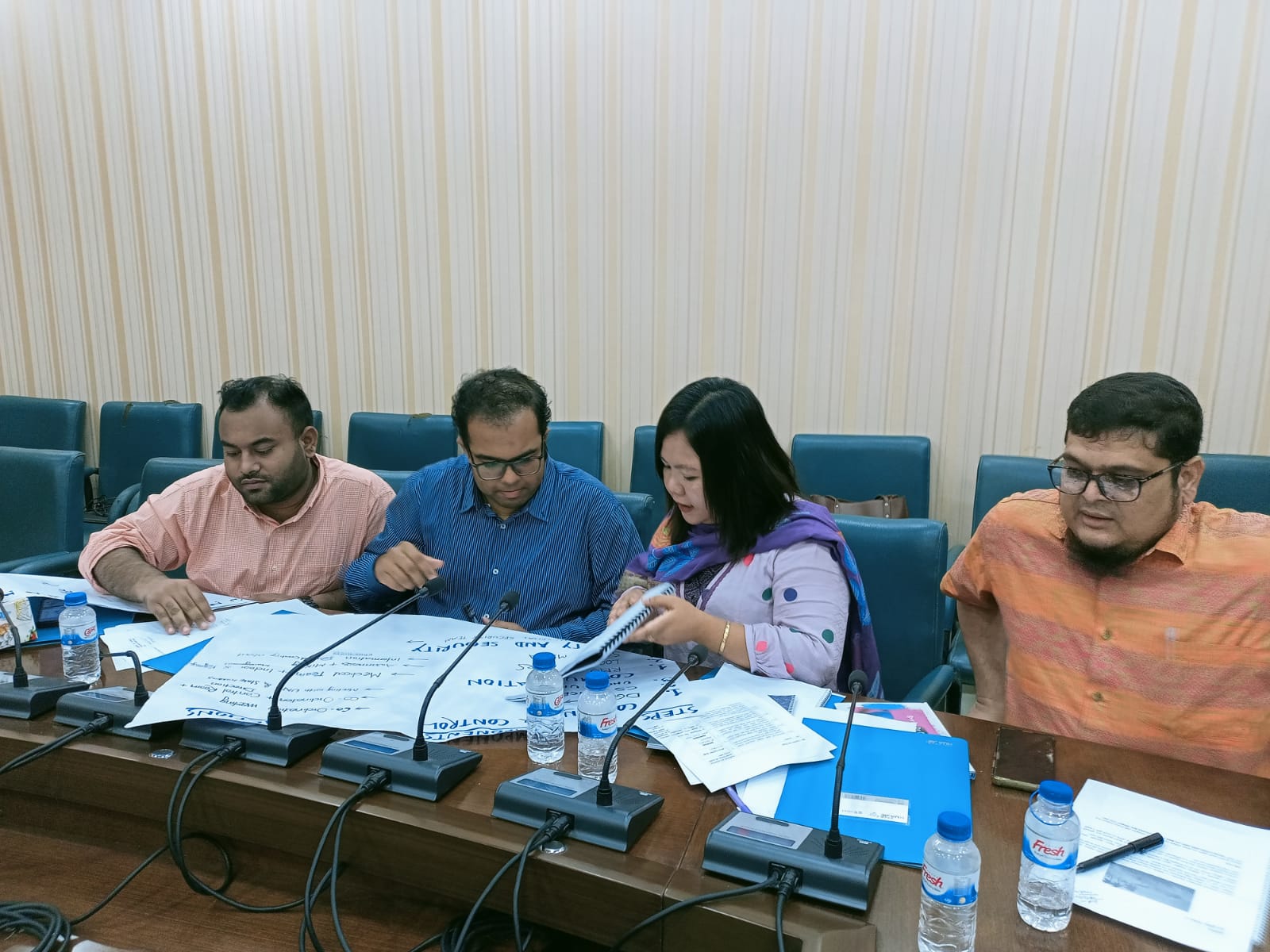BCCP expanded efforts for capacity building of health professionals on climate change interventions
BCCP expanded efforts for capacity building of health professionals on climate change interventions under WHO funding. A series of eight-batch training was conducted at headquarter districts of eight divisions for the medical professionals of the upazila health complexes and the Civil Surgeon offices. This two-day training, titled as “Climate Informed Hospital Emergency Preparedness and Response Plan”, followed a well-conceived curriculum which has been reviewed, made certain revisions and tested with the WHO and IEDCR. All the divisions namely Mymensingh, Chottogram, Sylhet, Khulna, Barishal, Rangpur, Rajshahi and Dhaka districts have been covered in this training program. Respective Civil Surgeon Offices of these districts provided management support for organizing these training events.
All these eight training programs were inaugurated by the respective Civil Surgeons of all the eight (8) districts and ninety-three (93) medical professionals from the Upazila Health Complexes attended the training course. Participants includes have been as below by category and number:
Deputy Civil Surgeon : 02
UHFPO : 39
RMO : 04
MO-DC : 10
Asstt. Surgeon : 04
Asstt. Registrar : 01
MO-CSO : 04
MO-UHC : 29
The key topics covered in the training program includes:
-
Introduction to climate informed hospital emergency preparedness and response plan
-
Command & control, communication and safety & security of the hospital and emergency response plan
-
Triage, surge capacity and the continuity of essential services in the hospital during emergency situations
-
Human resource, logistics and supply management of the hospital and emergency response plan
-
Post disaster recovery of the hospital and emergency response plan
-
Beneficiary awareness and engagements in response to climate change through client-provider interaction
-
Process and steps for changing human behavior to respond for adaptation and mitigation of climate change.
A combined form of methodologies was followed in planning, organizing and conduction of the training program and facilitating sessions that followed the Reflection, Discussion and Synthesis model of training which includes;
-
Plenary discussion with question and answer
-
Group work and group discussion
-
Visualized display and video presentation
-
Worksheet exercise in plenary and in groups
-
Group presentation.
An experiential learning process was adopted to encourage training participants to bring up their own ideas and thoughts while they interacted in plenary and during the group discussions of the training sessions. Throughout the eight batches of training, the participants were found very proactive in asking questions, responding to the issues raised by the facilitators and get interacted between and amongst the participants and facilitators.
There was a good display of their attention in the session discussions, learn from the experiences and taking proactive part in the group discussions that crafted in the post assessment in compared to the pre assessment. It brought out the following scenarios:
Average scores in the pre-assessment: 15.86
Average scores in the post-assessment: 52.26
The above scenario shows that there was a significant increase of 367.33% (3.67 times) in the post-assessment.
 An evaluation was conducted at the end of the 2-day training to assess how participants evaluate the training course in respect to the topics of the course, quality of learning process and learning environment, quality of the training methodology and their overall satisfaction over the training course. The evaluation reveals that their average satisfaction level was 8.72 over a scale of 1 – 10 where 1 was for their least rating of satisfaction and 10 was for the highest one.
An evaluation was conducted at the end of the 2-day training to assess how participants evaluate the training course in respect to the topics of the course, quality of learning process and learning environment, quality of the training methodology and their overall satisfaction over the training course. The evaluation reveals that their average satisfaction level was 8.72 over a scale of 1 – 10 where 1 was for their least rating of satisfaction and 10 was for the highest one.
It is envisaged that this training will sensitize the key service delivery sites at the community level to adopt and bring into practice the Climate Informed Hospital Emergency Preparedness and Response Plan. This preparedness and response plan will have a direct impact during emergency health service delivery needs out of the effect of climate change. In case of any other health emergencies this preparedness will contribute a lot during such a situation.

 An evaluation was conducted at the end of the 2-day training to assess how participants evaluate the training course in respect to the topics of the course, quality of learning process and learning environment, quality of the training methodology and their overall satisfaction over the training course. The evaluation reveals that their average satisfaction level was 8.72 over a scale of 1 – 10 where 1 was for their least rating of satisfaction and 10 was for the highest one.
An evaluation was conducted at the end of the 2-day training to assess how participants evaluate the training course in respect to the topics of the course, quality of learning process and learning environment, quality of the training methodology and their overall satisfaction over the training course. The evaluation reveals that their average satisfaction level was 8.72 over a scale of 1 – 10 where 1 was for their least rating of satisfaction and 10 was for the highest one.